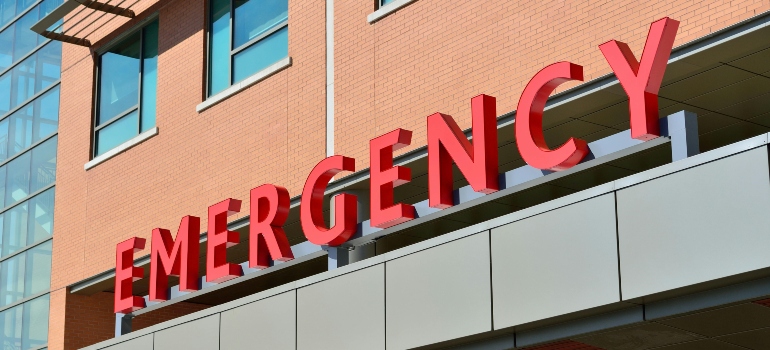When facing an emergency detox situation, understanding your options and how insurance coverage works is critical. Detox services are designed to help individuals safely manage withdrawal from substances, but the costs can add up quickly. The good news is that many insurance plans cover detox services, though the specifics can vary depending on your policy. In this blog, we’ll break down what you need to know about emergency detox services and insurance coverage, and what steps you can take to make sure you’re prepared when you need help the most.
What are Emergency Detox Services?
Emergency detox services offer critical medical assistance to individuals who are facing severe withdrawal symptoms or life-threatening situations due to substance use. These services are designed to provide immediate care, ensuring the person’s safety as they go through the challenging and sometimes dangerous process of withdrawal. This could be due to a substance overdose, where rapid medical attention is required, or because of intense withdrawal symptoms from drugs like alcohol or opioids, which can lead to serious health complications like seizures or delirium if not handled properly.

Emergency detox usually takes place in a medical setting with constant monitoring, medications to ease withdrawal symptoms, and support to stabilize the patient physically and mentally. This immediate care helps prevent life-threatening situations and prepares the person for the next steps in their recovery. Detox services also pave the way for further addiction treatment by clearing the body of harmful substances and preparing individuals for long-term recovery efforts.
These services are particularly important in cases of overdose, severe withdrawal, or when an individual’s substance use has escalated to dangerous levels. Emergency detox ensures the person gets the care they need right away, reducing risks and creating a safer path toward recovery.
Types of Emergency Detox Programs
There are two main types of emergency detox programs: inpatient and outpatient, each catering to different levels of need.
In inpatient detox, individuals stay in a medical facility 24/7. Healthcare professionals closely monitor their progress, providing medication and support to manage severe withdrawal symptoms. This option works best for people with severe addictions, complicated withdrawal symptoms, or co-occurring medical issues.
In outpatient detox, individuals receive treatment during scheduled visits but continue living at home. This setup offers more flexibility, allowing them to maintain daily routines like work or family responsibilities. Outpatient detox works well for those with milder withdrawal symptoms or a strong support system at home. Medical professionals provide regular check-ups and adjust medications as needed.
Specialized detox services cater to specific substances. For example, opioid detox often involves medications like methadone or buprenorphine to manage withdrawal, while alcohol detox might include benzodiazepines to prevent complications like seizures.
The Detox Process
During the detox process, individuals can expect several steps designed to manage withdrawal symptoms safely. The process begins with an evaluation, where healthcare professionals assess the substances involved, the severity of dependence, and any co-occurring medical or mental health conditions. This initial evaluation helps shape a personalized treatment plan tailored to each person’s needs.

Next, individuals move into the stabilization phase. In this step, healthcare professionals focus on managing withdrawal symptoms through medical supervision and medications, if necessary. For example, those withdrawing from opioids may receive methadone or buprenorphine to ease cravings and discomfort, while individuals detoxing from alcohol might receive benzodiazepines to prevent seizures.
Throughout the process, healthcare professionals play a critical role in ensuring patient safety and comfort. They continuously monitor vital signs, adjust medications, and provide emotional support. Their involvement helps reduce the risk of complications, such as seizures or dehydration, which can occur during withdrawal.
The detox process concludes with preparation for further treatment, where healthcare professionals help patients transition into longer-term recovery programs, such as counseling or rehabilitation. This final stage ensures that detox is not seen as a standalone solution but as the first step toward lasting recovery.
Duration of Detox Services
The typical duration of emergency detox services varies but usually ranges from 3 to 10 days. This timeline depends on factors like the substance involved, the severity of the addiction, and the individual’s overall health. For example, alcohol detox often lasts between 3 to 7 days, while opioid detox may take 5 to 10 days or longer, depending on the type of opioid used and the level of dependence.
Several factors can influence the length of stay in detox. Substance use history plays a significant role—individuals who have used a substance for a long period or in large amounts typically require a longer detox process. For example, someone with long-term benzodiazepine use may experience withdrawal symptoms for weeks, and detox can take longer to manage safely.

The severity of withdrawal symptoms is another critical factor. Severe symptoms like seizures, hallucinations, or delirium, common in alcohol or benzodiazepine detox, often require extended medical care and can prolong the process. Additionally, individuals with co-occurring mental health conditions or chronic illnesses may need more time to stabilize during detox.
Insurance Coverage for Emergency Detox
Insurance coverage for emergency detox services typically includes some form of medical detox treatment, but the extent of coverage depends on the individual’s insurance plan. Most health insurance policies cover detox services, as they are considered essential treatments for substance use disorders. However, factors like whether the provider is in-network or out-of-network, the type of substance involved, and the specific insurance plan all influence the level of coverage and out-of-pocket costs.
For instance, if you have Blue Cross Blue Shield drug rehab coverage specifics vary depending on the plan and location. BCBS plans often cover both inpatient and outpatient detox services, but patients generally pay less if they use an in-network provider. In-network providers have pre-negotiated rates with the insurer, reducing costs for the patient. However, if a patient chooses an out-of-network provider, they may face higher out-of-pocket expenses.
Similarly, with Humana rehab coverage for emergency detox services there can be significant cost differences with different provider networks. Humana covers both in-network and out-of-network services, but patients using out-of-network providers may face higher deductibles and co-insurance.
Navigating Insurance Plans
Navigating insurance plans for emergency detox services and insurance coverage can feel overwhelming, but understanding key details of your plan will help ensure that you receive the care you need with minimal out-of-pocket costs. Here are a few tips to guide you through the process:
- Review your plan’s benefits: Start by carefully reading your insurance policy, paying close attention to detox services coverage. Look for sections on substance use disorder treatments, and check if the plan covers both inpatient and outpatient detox. Many plans, including those from major providers like Peia insurance rehab coverage, will cover detox services, but the level of coverage can vary significantly.
- Understand deductibles and co-pays: Knowing your deductible (the amount you must pay before insurance kicks in) and co-payments (the flat fee you pay for each service) is crucial. Some plans may have high deductibles you pay before they cover detox services. Check if your policy has a maximum out-of-pocket limit, which can cap your total expenses for the year and help you avoid unexpected costs.
- Check network status: Always verify whether the detox provider is in-network. In-network providers generally offer lower rates due to contracts with the insurance company, significantly reducing your costs. For example, look for drug rehab that accepts Tricare as in-network provider.
- Confirm pre-authorization requirements: Some insurance plans require prior approval before they cover detox services. Contact your insurance provider to confirm whether pre-authorization is necessary and how to obtain it.

Common Insurance Limitations
When it comes to emergency detox services and insurance coverage, many insurance policies have common limitations or exclusions that can impact what’s covered. Understanding these restrictions is essential to avoiding surprise bills.
- Limited coverage for certain substances: Some insurance plans may not cover detox services for all substances. While coverage for alcohol and opioid detox is common, other substances like benzodiazepines or stimulants might have different or more restrictive coverage policies.
- Pre-authorization requirements: Many insurance providers require pre-authorization before they approve detox services. Failing to get this authorization can result in claims being denied, leaving you responsible for the full cost.
- Caps on the number of days covered: Insurance policies often limit the number of days they will cover for inpatient detox services. For example, a policy might only cover up to 5 or 7 days of inpatient detox, even if medical professionals recommend a longer stay.
- Excluded services: Some insurance policies exclude coverage for certain types of detox, such as holistic or non-medical detox services. If you opt for these alternatives, you may need to pay entirely out-of-pocket.
How to Verify Insurance Coverage
To verify insurance coverage for emergency detox services, start by contacting your insurance provider directly. Call the customer service number on the back of your insurance card and ask for details on your coverage for substance use disorder treatments, specifically emergency detox services. Ensure that you clarify whether your plan covers both inpatient and outpatient detox, and if there are any restrictions or pre-authorization requirements.
Next, ask for a list of in-network providers. Using in-network providers will help reduce out-of-pocket costs, so confirm whether the detox center you’re considering is part of your insurer’s network. If you are looking into rehabs in WV that accept Medicaid, they usually provide comprehensive information on network providers.
Another option is to consult with the detox or treatment center directly. Many treatment centers offer insurance verification services, where they can assist you by checking your coverage on your behalf. This step can save you time and ensure that you’re aware of potential costs upfront. You can call them and ask “Does FMLA cover rehab.” Additionally, these centers can guide you through the pre-authorization process.
Alternatives to Emergency Detox Services and Insurance Coverage
For individuals without insurance or those facing high out-of-pocket costs, several alternatives to traditional insurance coverage can help make emergency detox services and insurance coverage more accessible. Many detox centers offer sliding scale payment plans, where the cost of treatment is adjusted based on your income level. This option can significantly reduce the financial burden, allowing you to receive the care you need at a more manageable cost. Nonprofit organizations, such as Substance Abuse and Mental Health Services Administration (SAMHSA) funded programs, may also provide detox services.

Another valuable option is government assistance programs. Medicaid and Medicare often cover detox services for individuals who meet their eligibility requirements. Medicaid, in particular, offers comprehensive coverage for substance use treatment, including detox, for low-income individuals. The Affordable Care Act (ACA) also ensures that substance use disorder services are considered essential health benefits.
Some states also provide state-funded detox programs for residents who cannot afford treatment, regardless of their insurance status. These programs aim to ensure that anyone in need of emergency detox can access the care they require, regardless of their financial situation.
What to Know About Emergency Detox Services and Insurance Coverage
Understanding emergency detox services and insurance coverage is essential for anyone seeking treatment for substance use disorders. Knowing what your insurance covers, the differences between in-network and out-of-network providers, and the potential limitations can help you avoid unexpected costs and ensure you receive the necessary care. If you don’t have insurance or face high out-of-pocket costs, options like sliding scale payment plans, nonprofit organizations, and government programs can provide valuable assistance. If you or a loved one is in need of immediate detox services, consider contacting Harmony Ridge Recovery Center. We offer compassionate, comprehensive care to help you start your journey toward recovery. Reach out today to learn more about your treatment options.



